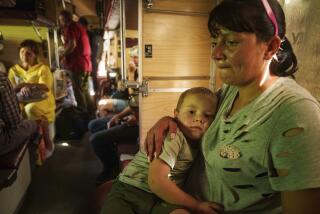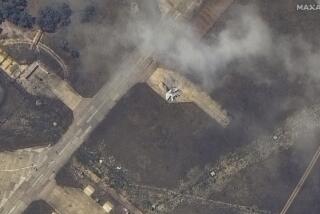Moscow Extends Lithuania Embargo to Food, Metals : Soviet Union: The leader of the local Communist Party appealed for compromise, saying that the price of independence “must have limits.” Earlier, soldiers stormed a printing plant and beat civilian guards.
- Share via
VILNIUS, Soviet Union — Moscow on Friday expanded its energy embargo on Lithuania to include certain shipments of food, metal and industrial parts in its continuing effort to crush the republic’s independence drive, Lithuanians said.
Dozens of Soviet soldiers also stormed a printing plant and beat civilian guards and a local legislator Friday, witnesses said.
The Kremlin “is seeking to stop the plants, put the workers on the streets, and encourage social unrest,” Lithuanian President Vytautas Landsbergis charged at a news conference Friday night.
Thus far in the 5-week-old standoff, no such unrest has occurred.
Despite military and economic pressure, Lithuanians have refused to back off their March 11 declaration of independence from the Soviet Union, as demanded by Soviet President Mikhail S. Gorbachev, and have solicited Western material and political support.
In Birmingham, Ala., where President Bush gave a political speech at a rally, spokesman Marlin Fitzwater said Friday the White House is “increasingly concerned” by reports of the Soviet economic crackdown on Lithuania and that Bush will be ready to brief Congress early this week on possible retaliation.
Lithuania was forcibly annexed by the Soviet Union in 1940.
Two ships from Cuba carrying raw sugar were diverted from the Lithuanian port of Klaipeda and a shipment of fish due from Latvia was sent elsewhere, Lithuania Deputy Prime Minister Romualdas Ozolas told reporters Friday night.
Lithuania produces more meat and milk than it consumes and is in no danger of starving.
But Lithuania’s Communist Party chief, Algirdas Brazauskas, said Friday this Baltic republic of 3.8 million people must compromise on its pro-independence decisions or face critical shortages of oil and natural gas in two weeks, after Soviet cutoffs and reductions the previous two days.
Brazauskas said Moscow also has cut off the supply of rubber tires, polyesterol, cables, bearings and caustic soda. Large scheduled shipments of metal and wood failed to appear, he said.
Most factories here are expected to close if Lithuania cannot solve either the embargo-induced shortages or the confrontation with Moscow.
“In two weeks we will have a critical situation,” Brazauskas told the Lithuanian parliament. “The price for independence must have limits.”
Algimantas Cekuolis, a newspaper editor and former Lithuanian representative in the Soviet parliament, told reporters Lithuanians may offer to freeze their new laws backing up independence, “if Moscow gives us guarantees of something.”
Gorbachev has refused to negotiate unless Lithuania rescinds its declaration of independence.
Prime Minister Kazimiera Prunskiene was in Norway on Friday learning about buying oil for hard currency at world-market prices instead of low-cost oil for Soviet rubles. She offered to trade Lithuanian dairy products and said she will seek financial aid from the West.
But even if she succeeds, she said Lithuania does not have the facilities to transport imported crude oil to the republic’s single refinery. Apparently, a pipeline would have to be altered.
A senior Western diplomat in Moscow noted that the Soviet Union would have to agree to Lithuanian imports because it controls the coastline.
Despite all this, Foreign Minister Lennart Meri of neighboring Estonia said in Finland on Friday his republic rejects Soviet threats and inducements and refuses to rescind a March 30 declaration proclaiming itself an occupied, independent state.
Armed soldiers stormed a Communist Party printing plant in the center of Vilnius on Friday afternoon, beating at least 12 civilian guards and a local legislator, witnesses said.
Soviet soldiers previously occupied more than a half-dozen party and public buildings, but without violence.
Lithuanian legislator Zigmas Vaisvilas told reporters the civilian guards arrived Friday at the plant, which already was occupied by a few Interior Ministry troops without weapons.
The Soviet news agency Tass said the colonel in charge asked the 27 civilians to leave and called in reinforcements when they did not.
Helmeted Soviet soldiers carrying automatic weapons and truncheons arrived in two trucks, surged into the building and beat some of the civilians, said witness Angele Guobiene, who works for the trade union journal Darbas Ir Poilsis, which is printed at the plant.
Newspaper editor Algimantas Cekuolis said the civilians, including legislator Vaisvilas, were hurt when they tried to bar the soldiers. Two or three people were hospitalized, Cekuolis said.
Tass said the civilians were hurt when soldiers shoved them bodily out the door.
Police kept reporters out of the building. Soldiers were visible behind a gate in the building’s courtyard. Some workers barricaded themselves near printing presses and looked out of open second- and third-floor windows.
About 500 people gathered outside. They sang nationalist songs and carried the hammer and sickle of the Soviet Union merged with the Nazi swastika.
Soldiers began occupying buildings in Vilnius a month ago, among them a plant that prints the republic’s newspapers. The plant occupied Friday prints non-political magazines.
Lithuania on Friday limited gasoline to about eight gallons a month for private cars and some large factories were to give workers a day off Saturday--the only conservation steps reported to deal with the cutoff of oil and loss of 80% of its supply of natural gas.
The energy embargo left Lithuania with only 15% to 17% of the 18 million cubic meters of natural gas it uses daily for homes and industry.
Parliamentary spokeswoman Daina Kalendra said that as of Thursday the republic has suffered no electricity shortage.
Brazauskas, an economic manager by training and chairman of parliament’s emergency energy committee, led the government until the pro-secession Sajudis movement won control in February elections and declared independence in March.
Last December he split his party from Moscow and won approval of many Lithuanian nationalists. Some see him as a pragmatist who best could deal with the Kremlin.
But deputies of the Supreme Council, Lithuania’s parliament, accused him Friday of trying to slow Lithuania’s independence drive.
“You’re raising a white flag,” charged Kazis Saya, a writer.
Gorbachev has demanded repeal of new republic laws that halt conscription of Lithuanians into the Soviet army and introduce identity cards for all citizens. He also complained about alleged seizure of Communist Party property.
Brazauskas said the March 11 declaration should not be reconsidered, but urged lawmakers to compromise on Gorbachev’s other demands “to take us out of this dead end.”
More to Read
Sign up for Essential California
The most important California stories and recommendations in your inbox every morning.
You may occasionally receive promotional content from the Los Angeles Times.










